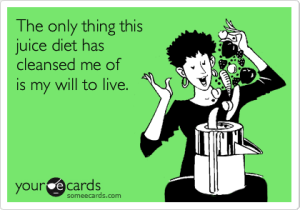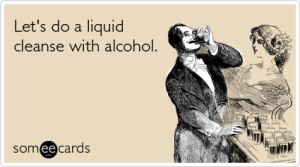Fat, Sick and Nearly Dead - Review
Over the last few years, documentaries and TV shows about diet and fitness have been popular. It started with Supersize me and a lot of other movies were about the same topic (such as Fat Head - the anti-Supersize Me). Over the last months, several folks asked me to watch Fat, Sick and Nearly Dead, reporting it has been a inspiring movie that motivated them to lose weight. As I cannot run so much these days, my workouts have been focused on indoor activities, which offered the opportunity to review the Netflix catalog while exercising.
 I was then able to watch the initial movie as well as the follow-up. The pitch: Joe Cross was the typical cliche of our society: he was obese and ate enormous amount of food while focusing mostly on his wealth (and not his health). He was severely overweight and that might reduce is life expectancy. In addition, he was really sick and his health metrics (blood pressure, cholesterol, etc.) were not very good. He decided to change his lifestyle to adopt a cleanse diet, which consists in having meals made with vegetable and fruit juices. The general idea is to clean the system from the bad stuff and load on nutrients (what he called macro-nutrients and is obviously wrong - but we will come back on that later).
I was then able to watch the initial movie as well as the follow-up. The pitch: Joe Cross was the typical cliche of our society: he was obese and ate enormous amount of food while focusing mostly on his wealth (and not his health). He was severely overweight and that might reduce is life expectancy. In addition, he was really sick and his health metrics (blood pressure, cholesterol, etc.) were not very good. He decided to change his lifestyle to adopt a cleanse diet, which consists in having meals made with vegetable and fruit juices. The general idea is to clean the system from the bad stuff and load on nutrients (what he called macro-nutrients and is obviously wrong - but we will come back on that later).
After a diet of 60 days with only juice, he lost weight and improved his metrics significantly. Since then, he has its own website to promote his method and inspire people. Great. The second movie is mostly a follow-up and shows the impact of the first movie. In this reboot, Joe talks with people that experienced the method all over the world. Basically, the second movie is more a promotion of the method, nothing really fancy. Now, let's have a look at the good and bad aspects of the movie.
The good
- Joe is not dogmatic during the movie and does not say this diet is the only way to lose weight but one over several. This is something really appreciated because in nutrition and diets, people are mostly dogmatic, telling you that if you do not follow their rules, you are doing it all wrong and gonna die/be fat again/lose your toenails (pick one or several of these).
- The diet is also about having more balance and adding more vegetables. Not having eating only vegetables. On the other hand, the movie does not educate about how to balance and with what other food you can balance your diet.
- Joe is seeking for medical advices during his study, which is a great decision. Many other folks are starting a new diet that could be potentially dangerous (pineapple diet anyone?). By seeking medical advice and compare his health metrics, he shows also that the objective is not only to get thiner but mostly improve your overall health.
The bad
- There is no real emphasis on the activity, which is also an important part of a healthy lifestyle. Movies such as Fat Head includes this aspect, emphasizing that Americans became very lazy over the last years. For sure, you cannot run if you are obese but starting to walk will exercise your body, develop your muscles and make your core stronger (and add more calories burned every day).
- The nutrition details are confusing and even totally wrong. For example, Joe talk about macro-nutrients for vegetables, saying he "needs to get his macro-nutrients". But vegetables and fruits are not about macro-nutrients. This has been pointed out by other critics as well.
- Even if the movie mentioned to mix with other food, there is no example about the ratio of juice and other food. Telling people to drink juice is one thing but educate the audience with information on food, the content, where to seek protein, fat could be even better and avoid any potential mistake: somebody that drinks juice everyday can ruin his efforts by mixing them with high-calories/low-nutrient food.
- The change is too radical and hard so that many people will not keep the pace. Who want to drink juice for the rest of their life? This diet is clearly not realistic and rather than focusing on drinking vegetables, I would rather recommend to have a balance between food, exercise and sleep.
 The ugly
The ugly
- The method is not too bad and Joe not dogmatic. But nutrition is like a religion for many folks and once they find their church, they try to convince you at all cost. And some newly converted to the cleanse diet are trying to justify their choices using ridiculous arguments. For example, on the second movie, one guy explains that he cannot eat anything but veggie because his body rejects them. He also argues that his son, when seeing the veggies on the table, have his digestive system lubricated to digest his vegetables to put down the good fiber. At first, I thought the dude was joking but after seeing the platters of veggies, it turns out he was pretty serious!
- The juice diet is really hard to follow and too many give up. During the first days, people experience change of mood, lack of energy, dizziness and other effects that can have an impact on your life, relations or work! Obviously, this diet seems too restrictive, hard to integrated in everyday constraints. I would rather adopt just reasonable changes rather than suddenly changing.
Let's watch or try?
If you have some time and like informative and inspirational shows about diet, this is a good entertainment for sure! The story is funny, there are some good information (except some nutrition basics) and this can be a good inspiration for people looking to lose weight.
Now, does the juice diet really work? On paper, the equation is really simple: to lose weight, you need to burn more calories than you eat. By eating only vegetables (that are very low in calories and high in vitamins), this is almost impossible to reach your basal metabolic rate so that you will lose weight if you stick to the plan.
On the other hand, during this loss of weight, your body will need calories and will burn fat but also muscles. In addition, as you do not provide enough energy, you will quickly feel low on energy and sleepy many times during the day. There is a fair chance you will become cranky or irritable, which is another side effect that will potentially impact your personal and professional relations.
"Do you really want to do that?"
Probably not and the change should not be radical but just to re-adjust the balance in your lifestyle: be reasonable most of the time but treat yourself, when you go to a party or a special occasion. Food has also a social aspect in our society: we go for ice cream with our girlfriend/wife/kids, we celebrate birthday at restaurant, we go for lunch or dinner with colleagues. And we remember these moments. They are special and connected to a special occasion.
For that reason, you do not need to make a radical change. You can still eat the high-calories/low-nutrient food on special occasions but stick to a reasonable diet routine (see some recipes examples) and still exercising for a couple of hours every week (if you are a dad or mom, this can be walk or play with your kids). This should be more than enough to keep people healthy, active while still enjoying good times with relatives and share social events.